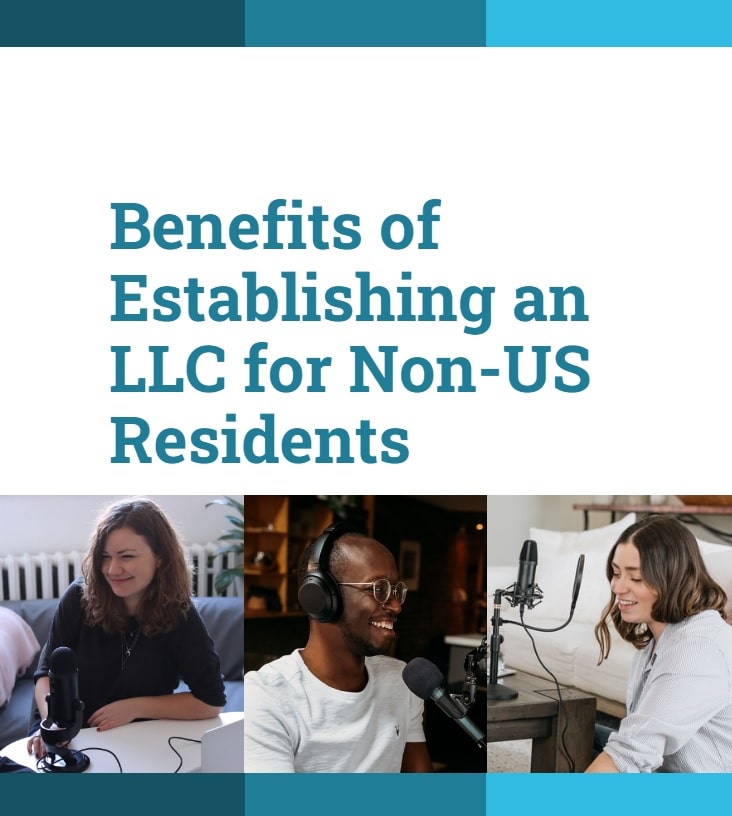Benefits of Establishing an LLC for Non-US Residents
When it comes to expanding business ventures internationally, non-US residents often face various challenges and uncertainties. However, forming a US Limited Liability Company (LLC) can provide numerous advantages and opportunities for these individuals. So, how to establish an LLC?
Table of Contents
This article will explore the benefits of forming a US LLC for non-residents, the process of forming one, and the essential legal requirements involved.
By understanding the potential advantages and necessary steps, non-US residents can make informed decisions regarding their business endeavors in the United States.
Benefits of Establishing an LLC for Non-US Residents
Limited Liability Protection One of the primary advantages of forming a US LLC for non-residents is the limited liability protection it offers. Limited liability shields personal assets from potential business liabilities, ensuring that non-US residents’ wealth remains protected in case of legal claims or financial difficulties. By separating personal and business assets, the LLC structure provides an additional layer of security and peace of mind for non-US resident entrepreneurs.
Tax Advantages of Establishing an LLC
US LLCs also offer attractive tax benefits for non-US residents. Through pass-through taxation, the LLC’s profits and losses flow through to the owners’ individual tax returns, eliminating the need for separate entity-level taxation.
This results in a more straightforward and efficient tax reporting process.
Furthermore, non-US residents can potentially avoid double taxation by leveraging tax treaties between the United States and their home countries.
Such treaties often provide relief from paying taxes on income already taxed in one jurisdiction.
Flexibility in Management and Ownership
Another compelling aspect of US LLCs is the flexibility they offer in terms of management and ownership. Non-US residents can easily manage their LLCs remotely, allowing them to oversee their business operations without the need for physical presence in the United States.
Additionally, the LLC structure permits various ownership arrangements, making it feasible to attract potential investors or partners who can contribute capital and expertise to the business.
Enhanced Credibility and Professional Image
Establishing a US LLC enhances the credibility and professional image of non-US residents.
Having a US-based business entity conveys a perception of professionalism and trustworthiness in the eyes of potential clients, partners, and investors.
This can significantly impact business transactions and foster long-term partnerships, leading to increased growth and success for non-US resident entrepreneurs.
Privacy and Asset Protection
Privacy is a crucial consideration for many non-US residents when conducting business abroad. Forming a US LLC can help maintain privacy by providing a layer of separation between personal and business activities.
Additionally, an LLC protects personal assets from potential business liabilities, ensuring that non-US residents’ wealth remains shielded from legal claims and other financial risks.
Global Market Access
By establishing a US LLC, non-US residents gain access to the global market. The United States is a hub for international business, providing numerous opportunities for expansion and growth.
With a US LLC, non-US residents can tap into the vast US market and leverage their business presence to explore international markets. This enables them to access a wider customer base, establish strategic partnerships, and capitalize on potential expansion opportunities.
| Benefit | Description |
| Limited Liability Protection | The LLC structure provides separation between personal and business assets, offering protection for personal wealth in case of legal claims or difficulties. |
| Tax Advantages | US LLCs offer tax benefits such as pass-through taxation and the potential to avoid double taxation through tax treaties. |
| Flexibility in Management and Ownership | Non-US residents can easily manage their LLCs remotely and have flexible ownership arrangements, attracting potential investors and partners. |
| Enhanced Credibility and Professional Image | Establishing a US LLC enhances professionalism and trustworthiness, positively influencing business transactions and partnerships. |
| Privacy and Asset Protection | US LLCs help maintain privacy and shield personal assets from business liabilities, safeguarding non-US residents’ wealth. |
| Global Market Access | A US LLC allows non-US residents to access the vast US market and expand globally, exploring international markets and partnership opportunities. |
Requirements and Process for Establishing a US LLC as a Non-US Resident
Researching and Choosing the Appropriate Jurisdiction
Selecting the right jurisdiction is crucial when forming a US LLC as a non-US resident. Factors such as taxation, legal framework, business-friendly environment, and industry-specific regulations should be considered.
Popular jurisdictions for non-US residents include Delaware, florida, and Wyoming, each offering unique advantages that cater to different business needs.
Meeting Legal and Regulatory Requirements for Establishing an LLC
To form a US LLC, non-US residents must adhere to certain legal and regulatory requirements. These include registering the LLC with the appropriate state authorities, obtaining necessary licenses and permits based on the business activities. Also, complying with local laws and regulations.
Familiarizing oneself with the specific requirements of the chosen jurisdiction is essential to ensure a smooth and compliant formation process.
Hiring Professional Services
Navigating the legal and tax complexities of forming a US LLC can be challenging for non-US residents. Engaging the services of legal and tax advisors with expertise in US business laws is highly recommended.
These professionals can guide non-US residents through the formation process, provide invaluable insights, and ensure compliance with all necessary legal and tax obligations. While professional services may involve costs, they can save non-US residents from potential pitfalls and complications down the road.
Opening a US Bank Account
Opening a US bank account is an integral part of establishing a US LLC. A US bank account provides convenience in managing financial transactions, receiving payments, and separating personal and business funds.
Non-US residents should inquire about the requirements and documentation needed for non-resident bank accounts, as each bank may have specific criteria to fulfill.
Considerations for Non-US Residents Operating an LLC
Tax Reporting and Compliance
Non-US residents operating a US LLC must understand and fulfill their tax obligations. This includes filing tax returns, reporting income, and complying with US tax laws.
It is essential to stay updated on any changes in tax regulations and seek professional assistance to ensure accurate and timely tax reporting. Non-compliance with tax requirements can result in penalties and legal consequences.
Visa and Immigration Implications
Forming a US LLC may have implications on the visa status of non-US residents. Entrepreneurs and investors may have opportunities to explore specific visa categories that facilitate business activities in the United States.
Consulting an immigration attorney knowledgeable in business immigration is advisable to navigate the complexities of visa and immigration requirements.
Maintaining Company Records and Corporate Formalities
Non-US residents operating a US LLC must adhere to corporate formalities and maintain proper company records. This includes holding regular meetings, documenting decisions, and maintaining accurate financial records.
By maintaining these records and complying with corporate formalities, non-US residents can demonstrate good corporate governance and protect the limited liability status of their LLC.
Conclusion on Establishing an LLC
Establishing a US LLC provides a host of benefits for non-US residents seeking to expand their business activities.
From limited liability protection to tax advantages, flexibility in management and ownership, enhanced credibility, and access to global markets, a US LLC can be a powerful tool for non-US resident entrepreneurs.
However, it is essential to carefully research the legal requirements, consult professionals, and stay compliant with US business laws. So that, you can ensure a successful and sustainable business venture in the United States.
By leveraging the advantages of a US LLC, non-US residents can unlock new opportunities and realize their business aspirations on an international scale.
Frequently Asked Questions (FAQs)
Can non-residents establish a US LLC?
Yes, non-residents can establish a US LLC. The US LLC structure is open to both US and non-US residents, providing opportunities for international entrepreneurs.
What are the benefits of forming a US LLC for non-residents?
Establishing a US LLC offers several advantages for non-residents. These are including limited liability protection, tax benefits, flexibility in management and ownership, enhanced credibility, privacy and asset protection, and access to global markets.
What is the process for establishing US LLC as a non-resident?
The process involves researching and choosing the appropriate jurisdiction, meeting legal and regulatory requirements, hiring professional services such as legal and tax advisors, and opening a US bank account. Each step is essential to ensure a successful US LLC formation.
Can a non-resident form an S-Corporation instead of an LLC?
Yes, non-residents can form an S-Corporation (S-Corp) in the United States. However, the eligibility criteria for S-Corps are more restrictive than LLCs. S-Corps require US resident shareholders, while LLCs do not have such restrictions.
What are the business legal requirements for non-residents establishing an LLC?
Non-residents operating a US LLC must comply with business legal requirements. This include maintaining proper company records, adhering to corporate formalities, fulfilling tax reporting and compliance obligations. And staying updated on any changes in US business laws that may affect their operations.

David is a dynamic, analytical, solutions-focused bilingual Financial Professional, highly regarded for devising and implementing actionable plans resulting in measurable improvements to customer acquisition and retention, revenue generation, forecasting, and new business development.










